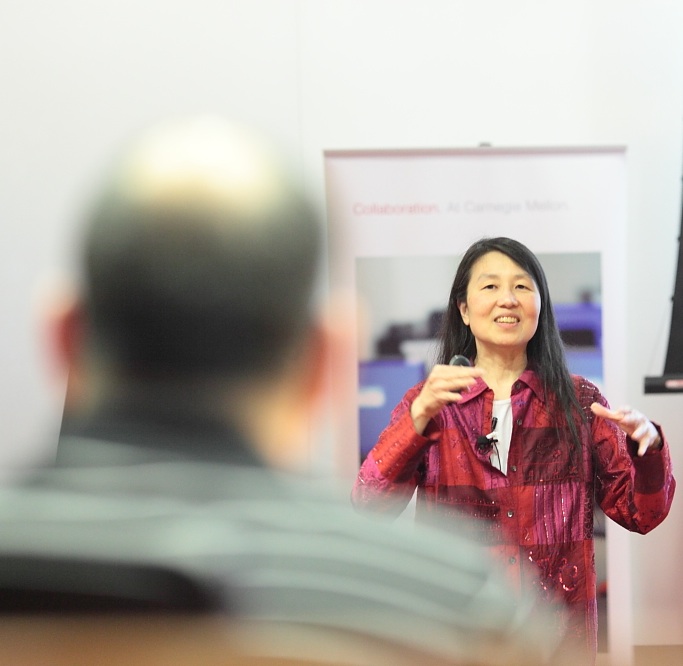"Computational Thinking" should be honed as a fundamental skill in educational programs, says expert at CMU
Byron SpiceThursday, April 14, 2011Print this page.

DOHA, QATAR- "Thinking like a computer scientist means more than being able to program a computer," said Jeannette M. Wing, Ph.D., the President's Professor of Computer Science and Head of the Computer Science Department at Carnegie Mellon University. Carnegie Mellon Qatar invited Wing to speak as part of its Computer Science Distinguished Lecture Series.
"Computational thinking is a fundamental skill used by everyone in the world, and should be incorporated into educational programs along with reading, writing and arithmetic to grow every child's analytical ability."
Wing, an internationally recognized leader and expert in computer science, was discussing her global vision and what she sees as important in the 21st century in front of a crowded audience of students, academics, alumni and other VIP guests on Tuesday at Carnegie Mellon University in Qatar. In her lecture titled "Computational Thinking", she emphasized the importance of computational thinking and its positive impact on future generations.
Computational thinking draws on the fundamental concepts of computer science such as abstraction, problem solving, designing systems and understanding human behavior. Mathematics and engineering principles are fundamentals in computational thinking- logic, efficiency, correctness, interaction. Computational thinking helps us figure out how to solve problems through reduction, embedding, transformation, decomposition or simulation. Skills that are used every day- such as planning, learning, scheduling, searching, making trade-offs - all come into play with computational thinking. There are many examples of the influence computational thinking has had on other disciplines. From deciding which line to stand in at the supermarket to sequencing the human genome, from air traffic control to the discovery and development of anti-inflammatory drugs- computational thinking comes in to play.
"Teaching computational thinking can not only inspire future generations to enter the field of computer science because of its intellectual adventure, but will benefit people in all fields," added Wing.
"Everyone is able to learn concepts of computational thinking and we should be taking advantage of the tech-savvy generation in order to teach more about computer science. We should try to teach the younger generation the reasons behind new technology," commented Wing.
Wing has received numerous awards and recognition for her work with respect to computational thinking and education. She was assistant director of the National Science Foundation's Computer and Information Science and Engineering directorate (NSF), and was recently elected as a member of the Computer Research Association's (CRA) board of directors.
Wing's involvement in major NSF programs including those focused on discovery and innovation, trustworthy computing and data-intensive computing, has helped push the boundaries of research in computing science, and has been cited as a critical dimension of America's innovation economy.
"Jeannette's 2006 viewpoint paper in the Communications of the Association for Computing Machinery, titled "Computational Thinking" started a discussion on how computer science needed to be viewed. She convincingly argued that the broad skills of computer scientists represent a universally applicable attitude and skill set everyone, including students and scientists from almost every other discipline, should have" said Kemal Oflazer, Ph.D., professor of computer science at Carnegie Mellon University in Qatar. "This is now being embraced by undergraduate curricula not just at CMU but at many other higher education institutions and also by secondary schools."
Carnegie Mellon Qatar's Computer Science Department has been very active since the introduction of the program in 2004, helping to spread technology awareness and knowledge in the Qatar community through its high school outreach programs as well as its academic courses. "At Carnegie Mellon, we teach students who are studying computer science to be innovative in their problem solving, to create new ways of doing something that has never been done before. They are able to do this through computational thinking- understanding the thought process behind layers of abstraction and mapping the process. Our graduates have been hired by organizations in energy, finance, real estate, media as well as technology because their thinking and approach to solving problems easily adapt to many disciplines," Oflazer added.
Carnegie Mellon's School of Computer Science is a premier institution for computer science research and education. Its Ph.D. program is currently ranked number one by US News and World Report. The faculty is made up of renowned researchers and academics, developing new methods and technologies, which have a significant impact across a wide variety of fields.
Jeannette M. Wing is an alumna of the Massachusetts Institute of Technology, where she earned bachelor's and master's degrees in electrical engineering and computer science, and a doctorate in computer science. She began her career as an assistant professor at the University of Southern California, and joined the Carnegie Mellon faculty in 1985. She has worked or consulted for AT&T Bell Laboratories, Xerox Palo Alto Research Laboratories, Digital Equipment Corp., USC/Information Sciences Institute, the Jet Propulsion Laboratory and Microsoft Corp.
Carnegie Mellon University in Qatar hosts a number of distinguished lectures that aim to bring leaders from around the world to the Doha campus to share their experience and discuss their area of expertise with university students and the community.


Byron Spice | 412-268-9068 | bspice@cs.cmu.edu
